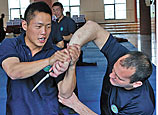
Live poultry will be allowed for sale in local markets starting today, almost 10 weeks after the city imposed a ban to prevent the spread of H7N9 bird flu.
Live chickens, pigeons and quails will be for sale, while live ducks and geese still are prohibited, officials said yesterday. They did not say when other types of live poultry might be sold.
Retail outlets qualified to sell live poultry must follow regulations strictly and disinfect their spaces regularly. The stores will be separated from the other sections of markets and have their own entrances.
The number of live poultry retail stores in the city will shrink from 461 before the outbreak to 200. One of the three main wholesale poultry markets will remain closed while the two others, in the Pudong New Area and Songjiang District, will reopen after test results are accepted by authorities.
The city is considering cutting back on live poultry sales every year between Spring Festival and the end of April. A preliminary proposal would ask designated retail outlets to close one day per week, while wholesale markets would close one or two days a week.
A tracking system will keep a record of live poultry suppliers and origins of their birds, covering breeding, wholesaling and retailing. Tracking information will be stored by wholesale markets and sent to slaughterhouses and retailers. Residents will be able to search for information online about the poultry they buy with a tracking number.
Frozen products, however, will continue to dominate the poultry market, officials said. Such poultry must pass strict inspections and are considered much cleaner and safer than fresh poultry. The live poultry trade will be gradually phased out due to hygiene problems.
Many residents still prefer live poultry due to tradition and the belief that fresh poutry is more tender and delicious. They also worry about the safety of chilled chicken.
"I prefer to buy live chicken," said Chen Ruanli, an older woman, said, "Now the food safety of frozen products is not so good. If the authorities can ensure the quality of chilled chicken, I may consider buying it."
H7N9 avian flu first appeared in humans this year in February, as flu-like symptoms popped up in eastern China. The National Health and Family Planning Commission announced the discovery of the H7N9 virus on March 31.
The flu caused 15 deaths in Shanghai but has abated this summer. The government closed all live poultry markets in Shanghai as of April 6, when China's death toll rose to six.
















 Controversial audition for 'rich blind date' -- being pretty is just not enough
Controversial audition for 'rich blind date' -- being pretty is just not enough


![]()
